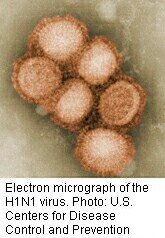
TUESDAY, July 10 (HealthDay News) — Although hastily created in response to the pandemic threat posed by the H1N1 flu virus, the vaccine for H1N1 is safe, even for expectant mothers and their babies, new studies show.
A Danish study that included more than 53,000 pregnant women, 13 percent of whom received the H1N1 vaccine, found no increased risk of major birth defects or pregnancy problems.
“We compared the vaccinated with the unvaccinated pregnancies with respect to a number of adverse events — major birth defects, premature birth and fetal growth problems. None of these adverse events were more common among H1N1-vaccinated pregnancies. We conclude that H1N1-vaccinated pregnancies are not at increased risk of these adverse events,” said Dr. Anders Hviid, a senior investigator at Statens Serum Institut, in Copenhagen.
Results of the study are published in the July 11 issue of the Journal of the American Medical Association.
The first case of H1N1 influenza was diagnosed in the United States in April 2009. This new flu was declared a pandemic flu in mid-June 2009. By mid-October, health officials had created and manufactured enough H1N1 vaccine to begin immunizing people at highest risk of complications and death from H1N1. By December 2009, the vaccine was widely available.
Pregnant women were among the high-priority groups, but safety data on the potential effects on fetuses were limited. However, the risks of contracting H1N1 during pregnancy were considered more severe, and the benefits of the vaccine appeared to outweigh any potential risk. More than 2.4 million American women were vaccinated against H1N1, according to the study.
In the current study, no difference in birth weights was detected among babies whose moms got the H1N1 vaccine during pregnancy and no increase in major birth defects was apparent in babies up to 1 year, the authors said.
Hviid noted that while this study adds to the literature on the safety of influenza vaccines in pregnancy, it isn’t a complete evaluation of vaccines in pregnancy. “We cannot recommend specific courses of action based only on our study. However, our results are certainly reassuring to pregnant women and medical professionals,” Hviid said.
Also, while the data on vaccination in the second and third trimesters provides “robust evidence of safety,” the authors said the findings on first-trimester vaccination are considered preliminary and need confirmation.
Dr. John Treanor, chief of the infectious diseases division at the University of Rochester Medical Center, in New York, said, “This is one more bit of info about the safety of vaccinations in pregnancy. There were many, many concerns at the time about potential side effects, but we didn’t see them.” He added, “The one thing we do have to get better at is getting it out to people early enough. We weren’t ready with the vaccine in the States until the second wave of the pandemic.”
Another study in the same issue of the journal found that while the risk of Guillain-Barre syndrome, a neurological condition that leads to weakness and loss of reflexes, was slightly increased after H1N1 vaccination, the risk was approximately two cases per 1 million doses.
There was significant concern when the H1N1 vaccine was in development because of an unusually high number of cases of Guillain-Barre in 1976 and 1977 following administration of the swine flu vaccine. Since that time, there hasn’t been a significant risk associated with Guillain-Barre and the seasonal flu vaccine.
Between October 2009 and March 2010 in Quebec, Canada, 4.4 million people received the new H1N1 vaccine. During that time, 83 people in the whole population developed Guillain-Barre. Twenty-five of those had been vaccinated for H1N1 in the previous eight weeks, and 19 of the 25 had been vaccinated in the previous four weeks. That translated to a risk of about 2 cases of Guillain-Barre for every 1 million doses of vaccine. The risk was only seen in people older than 50, according to the study.
“In Quebec, the 2009 influenza A (H1N1) vaccine was associated with a small, but significant risk of [Guillain-Barre syndrome]. It is likely that the benefits of immunization outweigh the risks,” wrote study authors Dr. Philippe De Wals of Laval University, in Quebec City, and colleagues.
Treanor said it’s almost impossible to know for sure if the vaccine caused the additional cases of Guillain-Barre, but emphasized that the individual risk is “very, very small.”
More information
Learn more about the flu and the seasonal vaccine from the U.S. Centers for Disease Control and Prevention.

